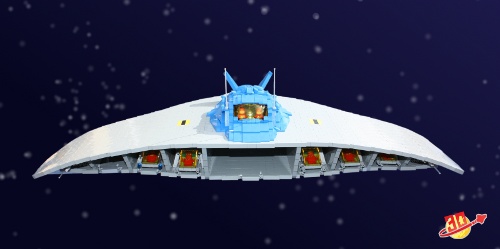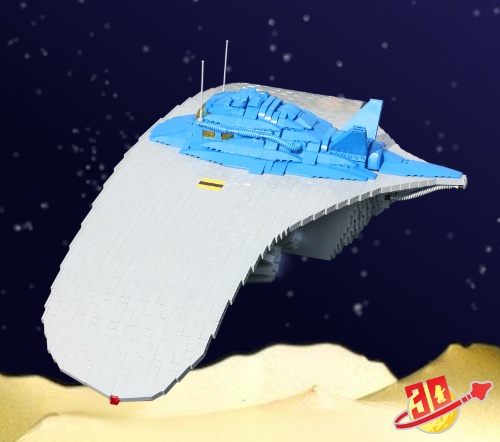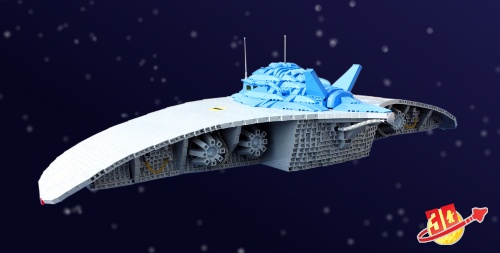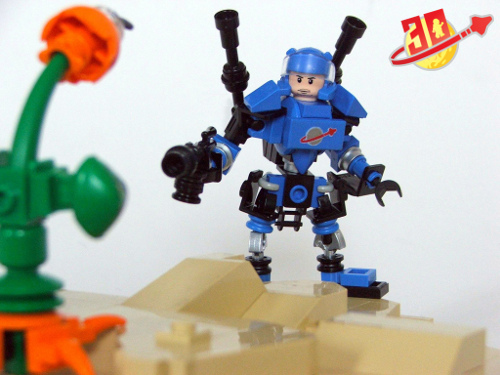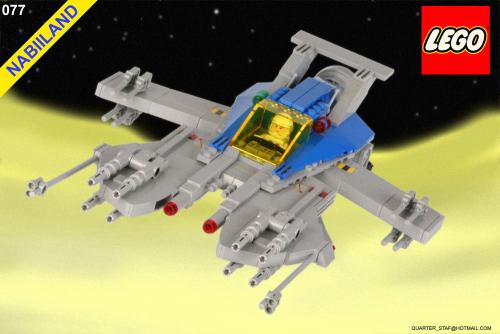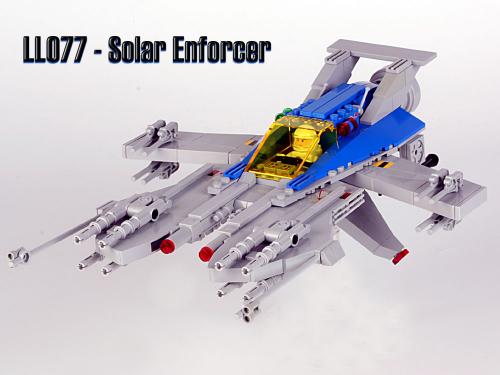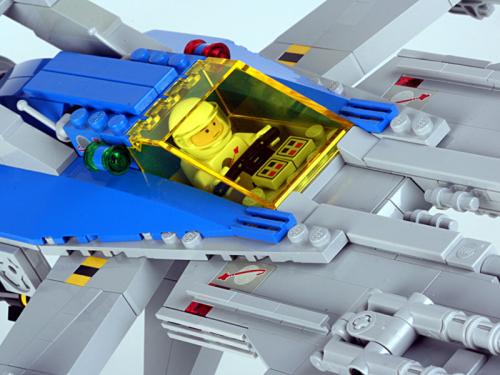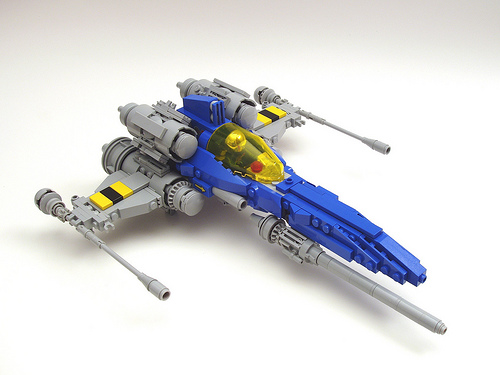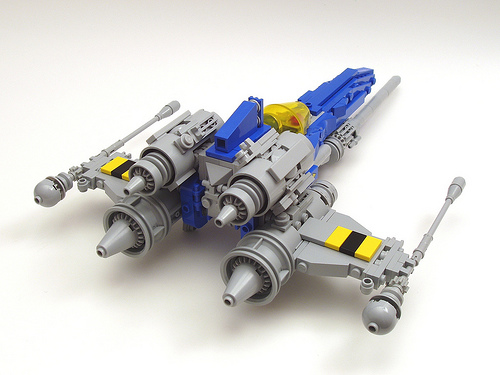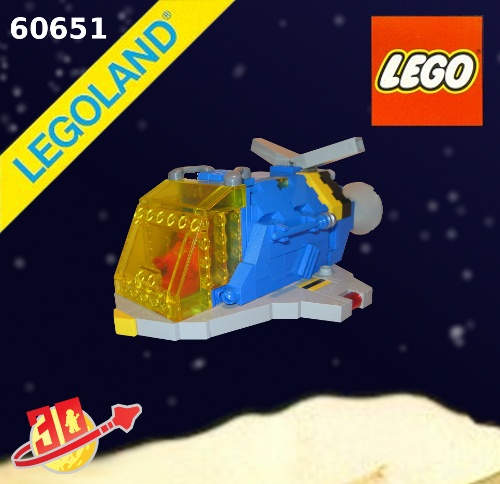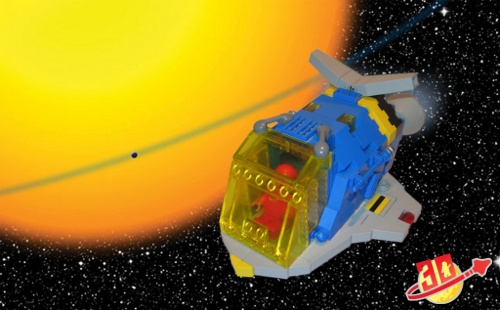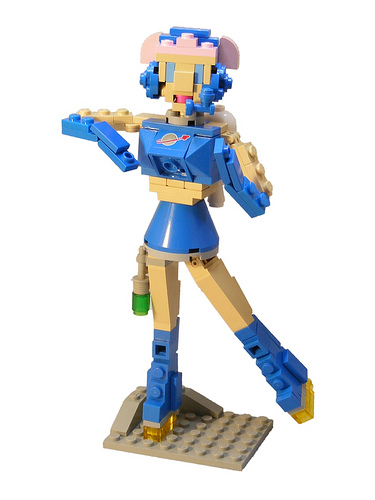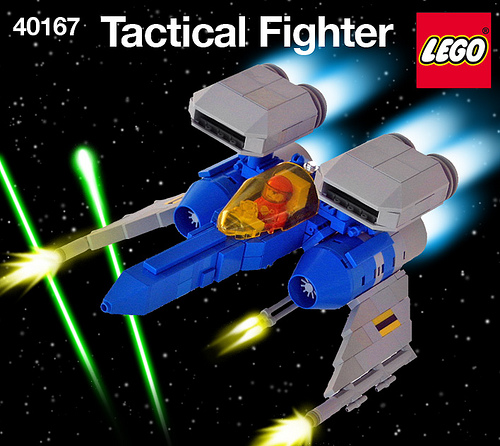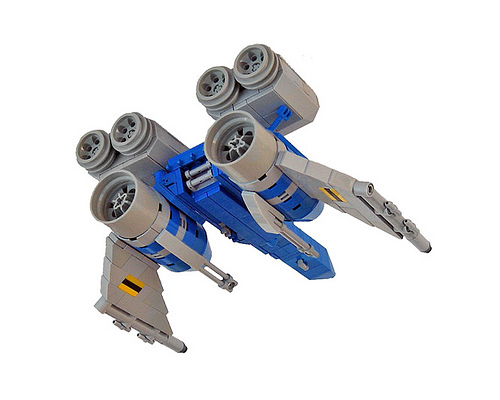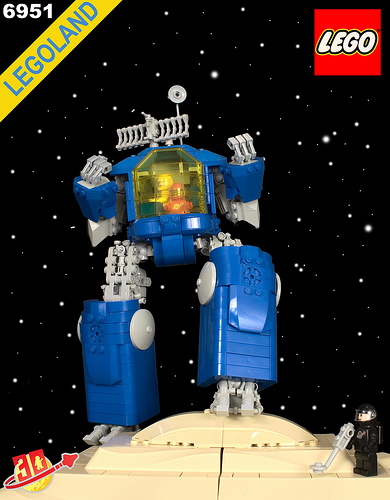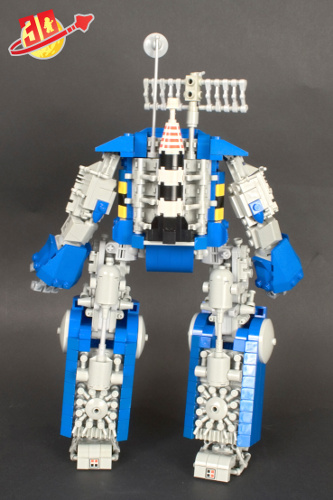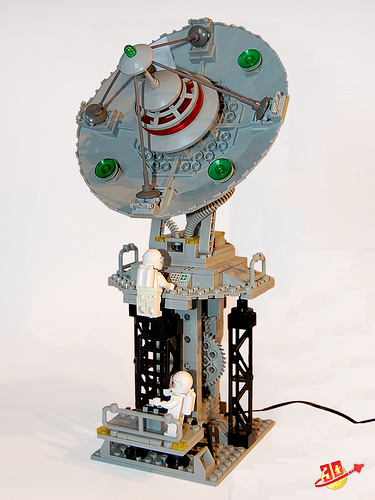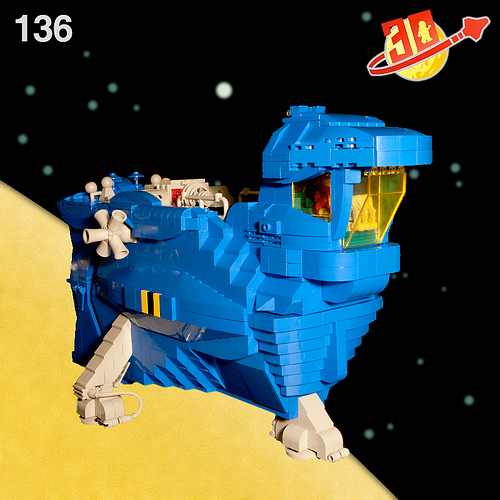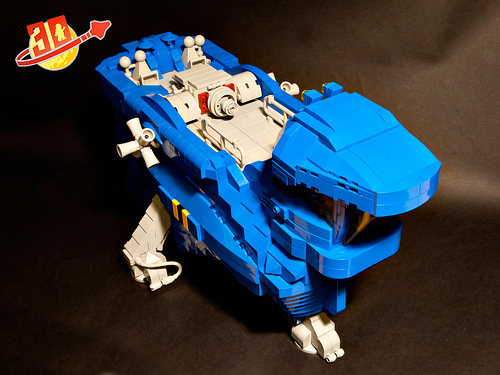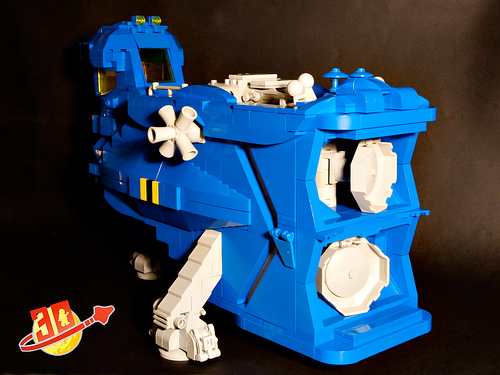Blogs
Day 28: LL-451 Manta at the Battle of Solice IV
28 March, 2009 - 07:03 — Legoloverman
Take a look at this beauty from James Shields. We've been following the
secret progress of this model for many months. Now that it's finished,
it doesn't disappoint.
Nobody knows quite why the Ugokin war started, but all attempts at finding a diplomatic resolution met with disaster. The war was proving long and bloody, and with the Ugokin almost never retreating, and self-destructing rather than surrendering, any victories came at a heavy price.
The first major break for the Federation came at the battle of Solice IV. Although hardly more than a skirmish in militaristic terms, it was the capture of a Ugokin "Hunter" class starfighter intact that allowed Federation scientists to decode secrets about the Ugokin spacecraft that are still classified today.
Day 27 Bonus: Space Marine Cyborg faces off Ugokin Warrior
27 March, 2009 - 23:35 — jamesA brave Space Marine Cyborg stands guard, blocking the way against the first of what will surely be a horde of Ugokin warriors, hoping his modified body will be strong enough to give his squad enough time to escape. Death may be certain for him, but at least if his buddies survive, he will be remembered as a hero.
Pete Reid's Cyborg is truly an awesome piece of work, demonstrating many incredible ways of connecting bricks together. like all of his amazing robots.
Day 27: LL-077 Solar Enforcer
27 March, 2009 - 03:46 — jamesToday we catch up with the military arm of the Federation, and one of their "big guns", Mark Stafford's LL-077 Solar Enforcer.
The LL-077 was one of the most heavily armed ships of it's era. Capable of decimating ground targets and maneuverable enough to more then hold it's own in a dog fight with the emerging threat of Blacktron. It's only drawback was it's own firepower, if all guns were fired at a target straight ahead the ship it would stop it's own forward momentum after only 5 seconds of firing, and early test pilot often found themselves in negative spins.
Mark says: Face it, whatever the classic space ship looked like, to a kid of the 70's they looked something like this in our heads, bristling with guns and ready for action! Just like in that Star Wars movie or Battle Beyond the Stars! Hope you all like it!
Day 26 Bonus: LL-562 Defender
26 March, 2009 - 23:31 — jamesA small, fast, heavily armed starfighter, Peter L Morris's LL-562 looks very swooshable indeed.
Peter says: So, this is more along the lines of what was going through my mind when I was asked to do a MOC for NCS month. Don't get me wrong, I'm glad I went with the Seraph, but it's not exactly swoosh friendly. It can be swooshed, but the wings get in the way and tend to bump into things. Plus it's a pain to just set somewhere, as something ends up getting bent out of whack. This is more my speed. Simple landing gear, relatively tough, and not too terrible to look at.
Day 26: LL-651 Mesa, Light Utility Shuttle
26 March, 2009 - 01:00 — jamesKeeping the vending machines in Federation space stations well stocked is a constant struggle, but Max Braun's LL-651 is up for the challenge.
The Mesa is the Pick-up truck of space. The Mesa most likely will not be romanticized or immortalized but its role cannot be dismissed. The Mesa can be found performing general light duty work or transporting small loads of cargo and personnel. The rugged and versatile Mesa helps fill a vital support role that keeps us in space.
We love the cockpit solution, giving the pilot a wide visibility, useful for those tricky space station dockings (they always send the service craft to the older docking rings which aren't as spacious as the modern ones), and the wedges for the large bumblebee stripe.
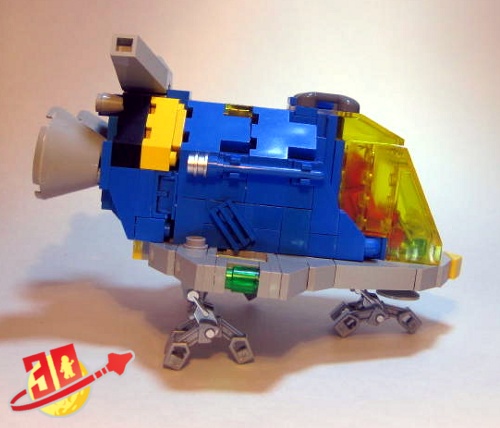
And we especially like the ramp at the back and the cutest little rover...
Day 25 Bonus: Classic Space Channel 5
25 March, 2009 - 23:26 — jamesAnother great bonus at Miniland scale from Jason Railton.
"Hey there, space cats - Ulala here coming at you live on Classic Space
Channel 5. I'm right here on Starbase 059 where the Ugokin have just
boarded the station and seized control!"
"I'm waiting for my translator to relay their demands. They're telling
everyone to get down... get... get on down! People - I think they want
to DANCE!"
Day 25 Bonus: LL-009 Tactical Fighter
25 March, 2009 - 23:08 — jamesAnother amazing bonus from Nnenn, the LL-009, a slightly out dated model, but still a work-
Without various upgrades and additions, the ancient LL-009 would be completely dilapidated. Differences in ground crew over the years have kept any two ships from looking identical. And though an embarrassment to most pilots, at least Synths will fly them.
Day 25: Robot Command Center
25 March, 2009 - 00:34 — jamesNext in our whistle-stop tour of the Federation is Dan Rubin's Robot Command Centre, another vehicle designed to overcome the limitations of wheeled transport.
The Robot Command Center fills a role in the fleet that was left lacking for some time. Although we have mobile rocket-launching vehicles, we had no capability to maintain control once a rocket passed over the horizon, unless a ship was in the system. Now, we’re able to establish a command and control presence on a new world simply by depositing one or more of these babies on a planet. They are able to quickly establish a network of control, using the standard satellite rocket launched from the back. The Robot Command Centers also allow us to move our ground staff out of the way of alien weather systems.
Day 24 Bonus: Deep Space Transceiver
24 March, 2009 - 23:16 — jamesAs a bonus for good behaviour, we're allowed a brief visit to the Federation's SETI institute, thanks to Louise Dade.
The Federation S.E.T.I. Institute has been scanning deep space for signs of extra-terrestrial life and sending out their own signals since the mid-20th Century. Quite what they plan to do if they find anything hasn't been discussed. Not in public, anyway.
This dish (inspired by OptimalControl's) has an old-style 9v motor built into it (see it working) - which needed gearing down. A micromotor might have been better, but I didn't have a spare one.
Day 24: LL-136 Poulet Class Heavy Tug
24 March, 2009 - 00:43 — jamesToday's stop on our whistle-stop tour takes us to one of the Federation ship yards, where Ian Greig's LL-136 Poulet Class heavy tug is one the main workhorses, pulling heavy loads with the utmost precision.
The Poulet Class Heavy Tug is a mainstay of orbital construction yards, salvage depots and dockyards. A very utilitarian design, it is effectively two high power engines with a high-visibility cockpit mounted on top. Uniquely, the main engines are steerable, providing the pilot with precise control. The cockpit provides all-round visibility, whilst also offering the pilot high levels of protection, should things get out of hand.
They are often operated in teams of three or four; advanced automation systems allow one pilot to control upto four Poulet Class Heavy Tugsfrom the cockpit of one of the tugs, or remotely using a Remote Operation Console.

